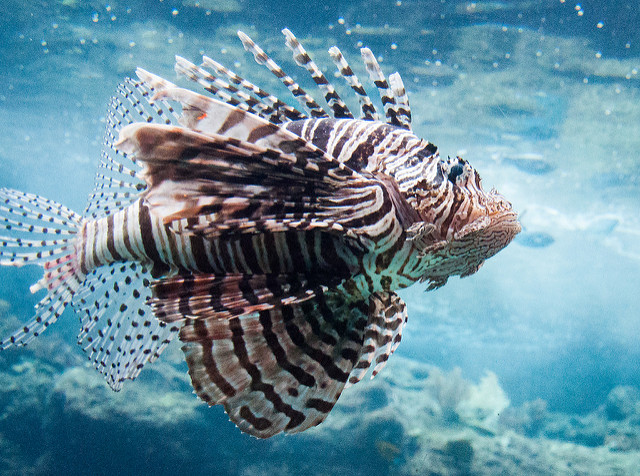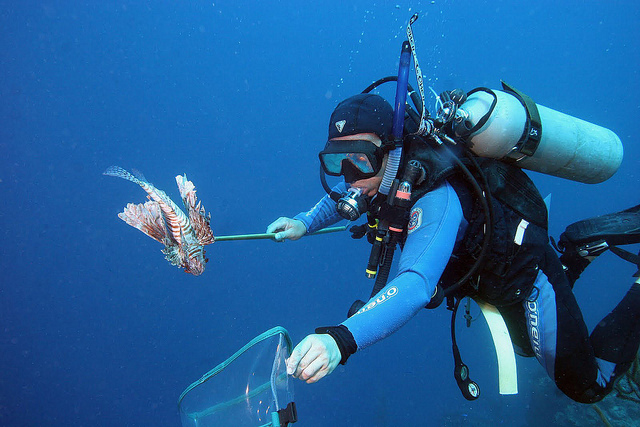
The runaway success of lionfish populations around the west coast of Florida could provide an insight into the future of Mediterranean marine life. Now, rising sea temperatures in the Mediterranean are coaxing the lionfish species to invade with potentially serious ecological and socioeconomic effects.
Lionfish are a striking species, cryptic in colouration with bold sail-like poisonous spines down the dorsal. However, the stunning anatomy and physiology of this species is not of concern, but their ability to invade and decimate entire ecosystems has raised the attention of scientists.
Evidence collected from divers and fishermen reveal that within the space of a year, the lionfish have invaded Cyprus. At least 24 new and confirmed sightings of 19 individuals were recorded. The report, published by Demetris Kletou, of the Environmental Research Lab, Cyprus, in the Marine Biodiversity Records.
“Until now, few sightings of the alien lionfish Pterois miles have been reported in the Mediterranean and it was questionable whether the species could invade this region like it has in the western Atlantic,” states Mr Kletou. “But we’ve found that lionfish have recently increased in abundance, and within a year have colonised almost the entire south eastern coast of Cyprus, assisted by sea surface warming.”
Kletou and his research team collated all the evidence collected from sighting reports, including photographic evidence, sightings and locations of invasion. In addition, the Department of Fisheries and Marine Research (DFMR), shared information and the specimens captured to the public to raise awareness of the situation.
Lionfish are generalist carnivores, they feed on a huge variety of fish and crustaceans. They spawn every four days, year-round, from a young age, producing approximately two million eggs which ride the oceans currents for one month, covering great distances before settling.
Their success at invading new environments branches from multiple factors and traits. Early maturation and reproduction, along with venomous spines to defend against predators and an insatiable appetite, makes the lionfish a deadly predator that can colonise reefs, outcompete its competitors and reduce its biodiversity within days. This could potentially have a great impact on fisheries, whereby other larger predator species, fundamental to feeding coastal populations, have a smaller chance at being successful of catching prey and eventually populations dwindle from the lack of food source.
Professor Jason Hall Spencer said: “Groups of lionfish exhibiting mating behaviour have been noted for the first time in the Mediterranean. By publishing this information, we can help stakeholders plan mitigating action, such as offering incentives for divers and fishermen to run lionfish removal programmes, which have worked well at shallow depths in the Caribbean, and restoring populations of potential predators, such as the dusky grouper. Given that the Suez Canal has recently been widened and deepened, measures will need to be put in place to help prevent further invasion.”

In the Mediterranean, the lionfish are just getting started. But without awareness, Kletou warned, it could quickly escalate, with other species expanding their presence to become an “invasive failure story.”
Lionfish are slow movers and are easily collected with the proper precautions and equipment. The divers and local fishermen could form a first line of defence against these invaders. Lionfish are becoming increasingly available as a dish in the Caribbean and are edible once the spines are removed, proving a resourceful way of reducing their populations.
Video of the invasive Volitans Lionfish in the Caribbean.
You want to support Anonymous Independent & Investigative News? Please, follow us on Twitter: Follow @AnonymousNewsHQ
This article (Invasive Lionfish Threatens Mediterranean Marine Biodiversity) is a free and open source. You have permission to republish this article under a Creative Commons license with attribution to the author and AnonHQ.com.




